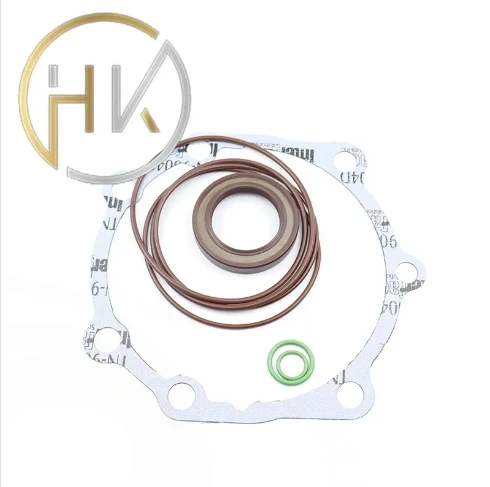9 月 . 29, 2024 07:41 Back to list
Exploring the Importance of Motor Seals in Vehicle Performance and Durability
Understanding Motor Seals Importance and Applications
Motor seals, often overlooked components in various machinery and engines, play a pivotal role in ensuring the efficient operation and longevity of motors and equipment. These seals are designed to prevent the leakage of fluids and gases while simultaneously protecting the internal components from environmental contaminants. In this article, we will delve into the importance, types, applications, and maintenance considerations of motor seals.
The Importance of Motor Seals
Motor seals serve multiple critical functions. First and foremost, they help to contain lubricants within the motor, which is essential for reducing friction between moving parts. Lubricants not only facilitate smoother operation but also dissipate heat generated by friction, thereby preventing overheating and potential damage to the motor.
Additionally, seals protect the motor's inner workings from dust, dirt, moisture, and other external contaminants. Contaminants can lead to premature wear and tear of motor components, resulting in costly repairs or replacements. By providing a barrier, motor seals enhance the reliability and performance of equipment, extending its lifespan and reducing maintenance needs.
Types of Motor Seals
There are several types of motor seals, each tailored for specific applications and environments
. The most common types include1. Oil Seals These seals are primarily used to retain oil within the gearboxes and bearings of motors. They have a lip design that fits snugly around a shaft, minimizing leakage and ensuring a tight seal.
2. Lip Seals Lip seals are designed to prevent leaks and are usually made from rubber or elastomeric materials. They create a dynamic seal against a rotating shaft, making them ideal for various motors, including electric and combustion engines.
3. Mechanical Seals Used in high-pressure applications, mechanical seals comprise two parts that create a seal against each other. They are widely used in pumps, mixers, and compressors where high reliability and performance are essential.
motor seal

4. O-Rings These circular seals are versatile and commonly used in motors to create a tight seal between different components. O-rings can be made from various materials, including rubber and silicone, to suit different environmental conditions.
5. Cork Seals While not as common as the others, cork seals are occasionally used in motors for specific applications, especially those needing a degree of compressibility and flexibility.
Applications of Motor Seals
Motor seals find applications across various industries, including automotive, aerospace, manufacturing, and consumer electronics. In the automotive sector, for example, seals are critical in preventing oil leaks from engines, ensuring that lubricants remain contained during operation. In industrial machinery, motor seals help maintain the efficiency of gearboxes and drive systems, reducing energy consumption and enhancing performance.
In the aerospace industry, precision-engineered seals are essential for maintaining the integrity of hydraulic systems, preventing leaks that could compromise safety and performance. Furthermore, the growing demand for electric vehicles has led to an increased focus on developing advanced sealing solutions that can withstand the unique challenges posed by electric motors.
Maintenance Considerations
Maintaining motor seals is crucial for the overall health of any machinery. Regular inspections can help identify signs of wear, such as cracking, deformities, or fluid leakage. If a seal is compromised, it should be replaced promptly to prevent further damage and inefficiency.
It's also important to select the appropriate seal material based on the operating environment and the fluids involved. High-temperature applications may require seals made from specialized materials capable of withstanding extreme conditions. Additionally, proper installation is vital; incorrect installation can lead to premature failure of the seal.
Conclusion
In conclusion, motor seals are indispensable components that significantly contribute to the functionality and durability of machinery across various industries. Understanding the types, applications, and maintenance of motor seals can help ensure that equipment operates efficiently and lasts longer. As technology continues to evolve, the development of innovative sealing solutions will remain critical in meeting the demands of modern engineering and manufacturing challenges. Therefore, investing time and resources in seal maintenance and selection is essential for businesses seeking to enhance operational reliability and performance.
-
The Power of Advanced Sealing: High-Pressure Solutions for Modern Machinery
NewsOct.29,2024
-
Optimizing Machinery with High-Performance Oil Seals
NewsOct.29,2024
-
Maximizing Machinery Efficiency with Advanced Oil Seals
NewsOct.29,2024
-
Ensuring Equipment Longevity with Quality Oil Seals
NewsOct.29,2024
-
Enhance Equipment Performance with Quality Oil Seals
NewsOct.29,2024
-
Custom Oil Seals for Specialized Machinery Needs
NewsOct.29,2024
-
The Role of Wiper Seals in Dust Sealing and Oil Protection
NewsOct.20,2024
Products categories
















